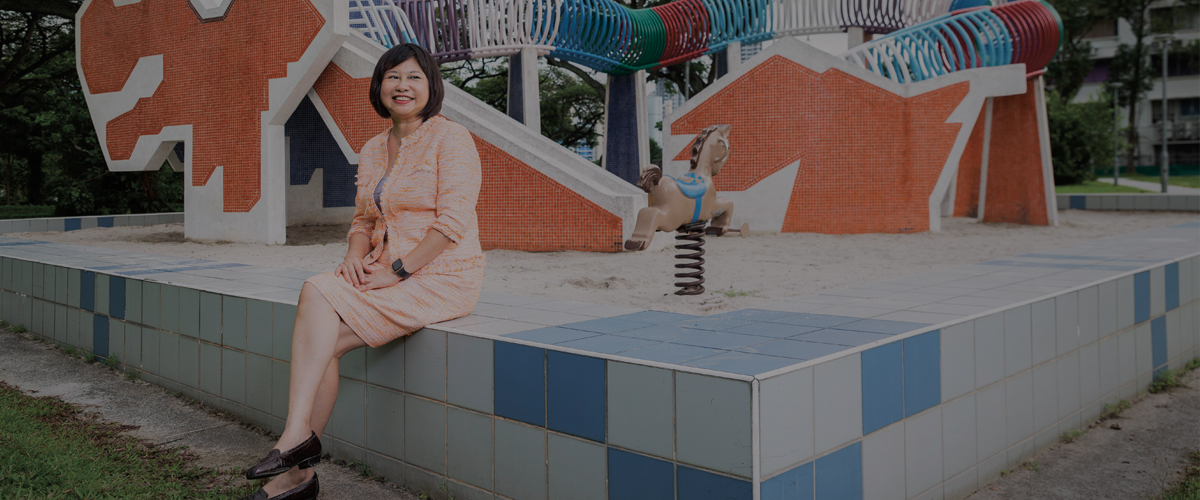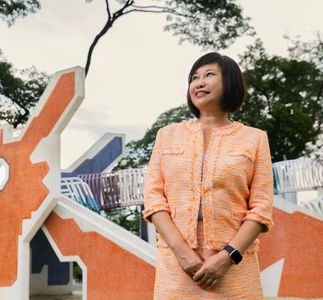From Risk to Sure Thing

From Risk to Sure Thing
Ho Yin Fong (’92) has helped make early childhood education in Singapore a national priority
On the evening of August 20, 2017, the Republic of Singapore’s prime minister delivered his annual National Day Rally speech to a packed auditorium, presenting the government’s priorities and goals for the coming year.
For the first 20 minutes of the hour-long address, Lee Hsien Loong spoke about the government’s commitment to early childhood education, says Lauren Thorman, who oversaw the former Wheelock College’s partnerships and programs in Singapore for 12 years and now is assistant director of operations for BU Global Programs. “Imagine a third of a US president’s State of the Union being about the early childhood system,” she says.
For Ho Yin Fong (’92), watching from home, the address was a measure of how much things had changed since she began working in early education in the early 1990s. A graduate of Singapore’s first master’s degree program in early childhood education—created in collaboration with Wheelock College—Yin Fong has been instrumental in the development of the field. Today, she is the dean of the National Institute of Early Childhood Development, a training institute founded by the island nation’s Ministry of Education.
To see her organization’s work recognized by the prime minister on the national stage, she says, “was a very moving moment for me.”

A Risk
Once a British colony, Singapore was recognized as a sovereign republic in 1965. Since then, its education system has rapidly developed a reputation as one of the world’s best: a recent assessment by the intergovernmental Organisation for Economic Co-operation and Development placed its 15-year-olds highest in the world in reading, math, and science.
For many years, however, early childhood education trailed the primary and secondary systems. The politically dominant People’s Action Party funded and ran hundreds of affordable kindergartens—Yin Fong herself attended one—in an effort to improve access to education. But the government left early childhood education to the private sector. As recently as the 1980s, there was a dearth of childcare centers in Singapore; many children stayed home with their families or caretakers until kindergarten, says Yin Fong, missing out on formal support during a fundamental period of brain development. And, like many countries across the world at that time, she says, teaching at a childcare center was not a prestigious job. It required only a high school certificate and paid a pittance.
Yin Fong’s parents were understandably shocked when, in 1990, their daughter announced that she would be giving up her stable human resources position in the Air Force to pursue a career in early childhood education. She had been teaching Sunday school for almost a decade and says “working with children brought me purpose, satisfaction, and joy—seeing their growth and development and how I can influence and make a small difference in their lives, directly and indirectly.” She landed a job with the National Trades Union Congress (NTUC) Childcare Services, formed in 1976 to provide accessible childcare to women who wanted to rejoin the workforce.
Her timing was serendipitous. Yin Fong’s entry into the field coincided with the first serious effort to professionalize the sector in Singapore—and the beginning of Wheelock College’s involvement in the city state’s early education system.
Yin Fong’s boss at the NTUC, Khoo Kim Choo, had begun collaborating with Joan Bergstrom, then a professor at Wheelock College and consultant to the Singaporean government, to develop the country’s first master’s in child development and early childhood education. The degree, a combined effort of Wheelock College and the NTUC’s training arm, RTRC Asia, aimed to build a core of professionals who were schooled in the methodology and pedagogy of early childhood thinking, who could then go on and coach others in the field across Singapore. Yin Fong joined the inaugural class.
“A lot of the folks who are now the leaders in the industry, they’re all graduates of that first cohort,” Thorman says.
During her studies, Yin Fong continued to work at an NTUC childcare center and remembers racing back and forth from her preschool classroom to the master’s program. “I was multitasking, managing the center, bathing children, and running everything,” she says. The 18-month degree program tackled topics from child development to research methods to curriculum design. Yin Fong was perpetually worried that she was in the bottom of a class packed with students with more early education experience.
But an end-of-year check-in with her professor, Marjorie Bakken (’81)—who went on to serve as president of Wheelock College from 1993 to 2004—gave Yin Fong a new outlook. “I’ll always remember that she said, ‘You have every potential to be a leader. You just need to get out of your comfort zone. Aspire for it, don’t just go through life and think that you’re not up to it.’”
Those words stuck with her. After earning her master’s, Yin Fong spent a year in Boston at Wheelock College, where she audited classes on infant-toddler development and childhood numeracy. When she returned to Singapore, she was offered a position at RTRC Asia, which had been established to provide early childhood education courses. Even as she rose through the ranks to become the center’s academic director in 2009, Bakken’s words continued to resonate. “It was the Wheelock culture that impacted many of us,” Yin Fong says. “We aspire to the same culture: to really respect adult learners and to build relationships with our students, while making sure what we teach is applicable in their classrooms.”
One of Yin Fong’s early initiatives after earning her degree was to help others who wanted to follow in her footsteps. In 1990s Singapore, training for early childhood educators was scarce. Teachers could apply to a government-run certificate program, but there were far fewer spots than applicants.
Just before Yin Fong joined RTRC Asia, the organization had worked with Bergstrom to design a Wheelock College–validated diploma program (similar to an associate’s degree in the US) to train teachers in a standardized way. It was a challenge from the start, beginning with donated books and just five full-time staff members. An added pressure was the steep tuition for the diploma program—S$5,000 (around US$3,600)—far above a teacher’s salary of S$600 to S$1,000 a month. “So we had that mandate,” Yin Fong says. “If our students had to pay such fees and if we are so passionate about early childhood education, we have to do the best for them.”
By 1996, the program had become so successful the government decided to help fund it. Although competing programs run by other training agencies had also sprung up, “students seemed to like the hands-on approach,” Yin Fong says. “We were told that our faculty were good role models and that they respected adult learners. So, it was by word of mouth that the popularity rose.”
Yin Fong went on to help support a wide range of early childhood education initiatives, many in collaboration with Wheelock: as cohorts continued to graduate from the masters’ program, she and the RTRC Asia team helped develop a bachelor’s degree, trained principals in management skills to mitigate burnout, and granted more than 3,700 diplomas.
According to Beth C. Fredericks, former Wheelock College Singapore executive director, one reason for Yin Fong’s effectiveness is her ability to balance shifting political demands with a commitment to the values she learned during her master’s program.
“In Singapore, the government makes a lot of decisions and holds a lot of purse strings,” says Fredericks. “Yin Fong has been able to really hold in one hand the Wheelock pedagogy, which she knows is good for kids and families, and in the other an ability to work with the government very effectively.
“Yin Fong has devoted her life to walking that tightrope, and she has been incredibly successful at it.”
A Sure Thing
In 2017, as part of the prime minister’s recognition of the importance of childhood education, the Singaporean national government formed the National Institute of Early Childhood Development (NIEC) as a subsidiary of Nanyang Technological University, which also houses the National Institute of Education, Singapore’s only teacher education college. The state identified the center Yin Fong worked at—which had been renamed the SEED Institute—as the country’s early childhood education pioneer and invited the majority of the staff, including Yin Fong, to join the new governmental organization.
Yin Fong now serves as dean at NIEC, which trains preschool teachers and principals, offering certificate, diploma, and continuing education programs. In her new role, she supports the professional development of faculty from the institute’s four campuses; she also heads its city campus.
But even as she looks ahead, Yin Fong treasures the past. She still has the receipt from her master’s program, almost 30 years ago. She had to borrow money from family members, then scrimped and saved for years to pay back her debts. “I never regretted my choice,” she says.
It’s a testament to Yin Fong’s success that if she’d made her “risky” career move today, it wouldn’t seem like much of a risk. She points to recent NIEC intake figures: two of the institute’s campuses recently attracted more than 700 students for its diploma programs. And now the nation boasts some 1,400 childcare centers.
Our Singapore Family
BU Wheelock has close to 4,000 alumni in Singapore, according to Singapore Lessons, a 2018 report charting the former Wheelock College’s work in the country.
Of those alums, 90 percent have worked as a teacher—and 30 percent as a principal—since graduating. The majority earned a bachelor’s degree in early education, while just over 10 percent—including Ho Yin Fong—picked up a master’s degree. There are more than 200 childcare centers employing BU Wheelock’s Singapore alums.
Yin Fong told Singapore Lessons that her collaboration with the former Wheelock College had “created a cadre of passionate and highly skilled early childhood faculty who developed a sound and progressive training model for early childhood professionals . . . [that] uplifted the professional lives of educators who went on to raise the bar for quality preschool education in Singapore.”